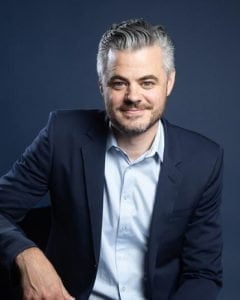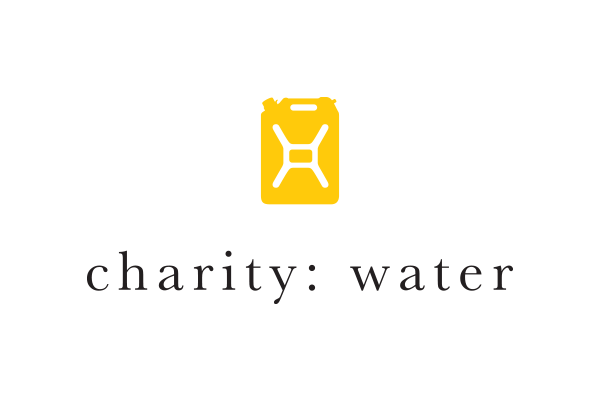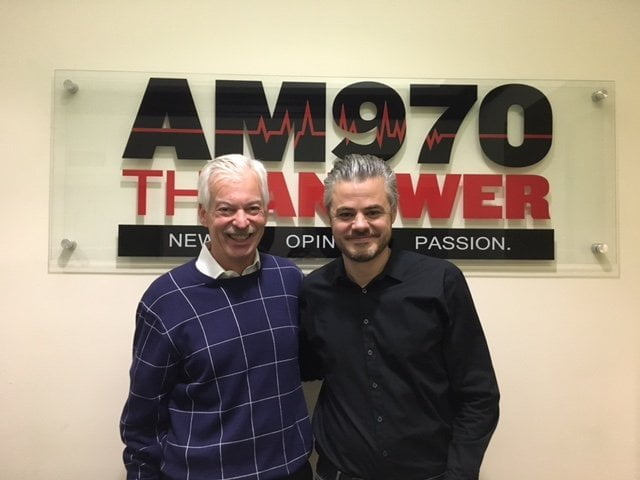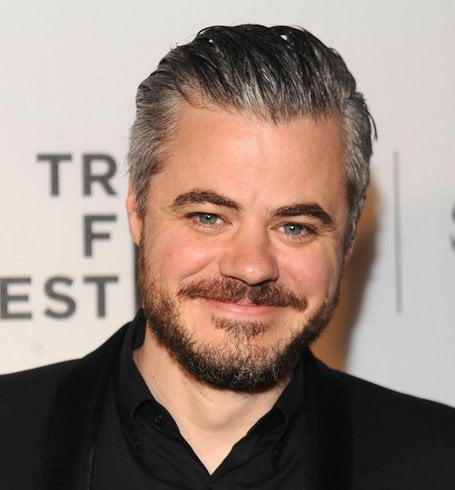The following is a conversation between Scott Harrison, founder and CEO of Charity: Water, and Denver Frederick, Host of The Business of Giving on AM 970 The Answer in NYC.
Denver: It was a bit over a year ago that I had the pleasure to have Scott Harrison, the founder and CEO of Charity: Water on the show. Well, he has recently come out with a great new book titled, Thirst, a Story of Redemption, Compassion, and a Mission to Bring Clean Water to the World, and I thought it would be a good idea to have him back for a few to discuss it with us. Good evening, Scott, and welcome to The Business of Giving.

Scott Harrison
Scott: Hey, Denver. It’s great to be back on. Thanks for having me.
Denver: My pleasure. For any listeners who may not be familiar with Charity: Water, just tell us a little bit about the organization.
Scott: Sure. We are focused on bringing clean and safe drinking water to every single person on this planet, and we are currently about 663 million people– or one/tenth of the world– away from achieving that goal. We’ve been fighting for this for about 12 years. What makes us unique is that 100% of all donations received from the public go directly to funding clean water projects, which we then prove using sensors and using satellite images on Google Earth and Google Maps so people can see where their money is going. That’s allowed us to get about 8.5 million people clean water.
Denver: Fantastic. You’re not our father’s charity or our grandfather’s charity. Your story’s gotten from a self-absorbed, wasted nightclub promoter to building a purpose-driven life and an extraordinary organization is really beautifully told in Thirst. But after a transformation like, how have you continued to evolve and grow? And in what ways has that happened?
Scott: I write about this in the book. I was a scoundrel. I was a degenerate nightclub hedonist for about 10 years, and I was fortunate at 28 to change course and go live in a humanitarian organization in West Africa and come across the water crisis. I think what was important for me was giving up all those vices in one fell swoop. I just realized that I couldn’t smoke again. I could never touch drugs or gamble or pornography or any of that stuff. I had to really shed the trappings of my old life in a cold-turkey fashion, I guess, if I wanted any new story to unfold. That was now 15 years ago. My life looks so different now. I’ve been able to travel the world preaching the message of generosity and compassion and care for others; preaching a message of clean drinking water. Everybody can agree on that.
It’s been a really nice thing. I’m married. I’ve got young kids now. My four-year-old the other day asked me how old he would have to be until he could go and help people get clean water like daddy. That made me feel great for a moment. I didn’t really know the answer. I said, “I don’t know, 16 or 18. I’m not sure.” It’s just a very different life.
I was chasing all the wrong things for so many years and hope that I can show my kids that a life of serving others and using your talents and your resources to do that is a much more fulfilling life.
Denver: It brings a tear to your eye.
Scott: It does, and I would hope that I can make it look fun to my kids. I’ve been to 69 different countries now. I’ve been to Ethiopia 30 separate times which is where we have a lot of our work. I was chasing all the wrong things for so many years and hope that I can show my kids that a life of serving others and using your talents and your resources to do that is a much more fulfilling life.
It was just fun being able to tell some of those stories and how I eventually found my way to water through health, realizing that so many of these people were sick because they didn’t have the most basic needs met for health, for life. Imagine not having clean water. Imagine having to walk six or seven hours every day to a swamp. Imagine losing a child in your arms to diarrhea… completely preventable, if you just had clean water.
Denver: For sure. The book is over 300 pages, although, I’ll tell you, it reads quite a bit faster than that. But that does require a significant amount of recollection and reflection. Was there a part of this book that you most enjoyed writing, or was the most beneficial for you, as you put down the words onto a piece of paper?
Scott: I love the Mercy Ships period of it. Going back and being able to honor some of the people that really inspired me back then. There was, in particular, a doctor named Gary Parker. Dr. Gary Parker. His story was amazing. He was a plastic surgeon from California that had heard about this floating hospital and said, “Okay, good, I’ll go do three months.” When I set foot on that hospital ship, he’d been there 20 years. He’s now been there over 35 years. It was just so fun being able to go back, look through some of the 50,000 photographs that I’d taken over that two-year period. This is was the eve of digital. You shot more than you needed to because it was free. It was just fun being able to tell some of those stories and how I eventually found my way to water through health, realizing that so many of these people were sick because they didn’t have the most basic needs met for health, for life. Imagine not having clean water. Imagine having to walk six or seven hours every day to a swamp. Imagine losing a child in your arms to diarrhea… completely preventable, if you just had clean water. It was fun.
I think the hardest part to write about was the nightclub part because I was just such an idiot. There are some people, we interviewed them, that I realized really hurt, living a valueless life… or certainly a life with all the wrong intentions. It was tough facing some of those demons.
I just think storytelling, it’s the most critical piece to the organization’s success. I think it’s why we’ve been able to raise over a third of a billion dollars in a short time and get a million people excited about an issue that really doesn’t face them… I think it’s the stories that are able to maybe get people to reject the apathy that’s so easy to embrace with these global issues and say, “Wow, maybe I can do something about it. Maybe I could help one person, one family, one community.”
Denver: Interesting when you look back like that. Speaking of stories, you are the consummate storyteller. Maybe that’s one of the skills you did pick up as a nightclub promoter that turned out to actually be pretty useful. What do you believe are the keys to telling a great story, and how has that helped advance the work of Charity: Water?
Scott: I just think storytelling, it’s the most critical piece to the organization’s success. I think it’s why we’ve been able to raise over a third of a billion dollars in a short time and get a million people excited about an issue that really doesn’t face them. Most people listening right now did not wake this morning saying, “I need to do something about the global water crisis.” They didn’t wake up with the 660 million people on their minds. They woke up and probably took a long shower and used some water maybe from their Britta filter to make their coffee.
It’s only stories that can get people to pause and say, “What if I woke up this morning, like a woman named Eberhat we were just with in Ethiopia, and I walked two and half hours, and I walked down to a swamp, and I was worried about hyena attacks on that walk. I was worried about maybe even being raped. Then I waited, and I dug in the sand, and I found water, and then I hauled it back three miles; 40 pounds on my back to then give it to my children. And I walked in and my children were crying, and I knew that this water might kill them. But there was no other solution.”
I think it’s telling these stories – there’s a story in the book where – I lived in a village where a 13-year-old girl hung herself. She spilled her water after one of these walks. I think everybody listening would agree that a 13-year-old girl shouldn’t have a noose hanging around her neck because she spilled her water. But when you understand it in the context of her life and her struggle in her village, it actually makes a lot of sense. I think it’s the stories that are able to maybe get people to reject the apathy that’s so easy to embrace with these global issues and say, “Wow, maybe I can do something about it. Maybe I could help one person, one family, one community.”
 Denver: I think you have a wonderful way of putting the reader or the listener in the scene of the story that you’re telling. You almost feel like you’re there and you’re witnessing it, as opposed to just listening to it, and I think that’s a real gift.
Denver: I think you have a wonderful way of putting the reader or the listener in the scene of the story that you’re telling. You almost feel like you’re there and you’re witnessing it, as opposed to just listening to it, and I think that’s a real gift.
Scott: Thank you.
…water is an unbelievable – it’s a unifying issue; whether you’re a Jew, whether you’re a Christian, whether you’re a Muslim, whether you’re a Mormon or an atheist, whether you’re a Republican or an Independent, or a Democrat; everybody can come together and stand for clean water for others.
Denver: The book is so much more than just your story, as inspiring as that is, and it comes along at a time when so many people are feeling stressed and anxious and lost… maybe more than anything else, it seems, disconnected. What would you say to those individuals who are having their Uruguay moment, and that’s where you bottomed out; that might help them take that first critical step?
Scott: That’s a great question. A couple of things I want to do with the book. I wanted to show people that no matter how stuck you might feel, no matter how you might have messed up in the past, chances are you weren’t half as bad as I was unless you killed someone. As you read this, it’s going to be hard to imagine a worse person that you might know, and I really wanted to show that nobody is beyond redemption. It’s never too late to change course, to walk 180 degrees in the other direction. I did that by returning to a lost faith and a lost virtue and a lost morality.
I would hope to say to people, “Look! Your past doesn’t need to define your future. In fact, all those terrible things in your past… all those mistakes, the things that you might be ashamed of… you can actually use to power a very different and significant future. If a scumbag, coke head, degenerate nightclub promoter can help bring clean drinking water to 8.5 million people and raise a third of a billion dollars, what might others do that haven’t even sunk to the depths of despair that I had?
The wonderful thing I think too about maybe this book at this moment is, water is an unbelievable – it’s a unifying issue. Whether you’re a Jew, whether you’re a Christian, whether you’re a Muslim, whether you’re a Mormon or an atheist, whether you’re a Republican or an Independent, or a Democrat; everybody can come together and stand for clean water for others. Regardless of those beliefs, it’s a big tent, and it’s been so exciting to see people who might fight to the death on every social or political issue known to man, but can come together under that tent. You know what? We believe in generosity. We believe in compassion. We believe that human beings need this basic; they need to have this basic need met to thrive, and we’ll support this.
Denver: Well said. Let me close with this, Scott. Charity: Water has helped to reimagine for the better what a nonprofit organization can and should be. The 100% model that you talked about a moment ago, your use of technology, radical transparency, and so on; the organization is now into its second decade, how do you see it being different? And what new boundaries do you think you’re going to be pushing here in the next decade?
Scott: It’s an exciting time of growth. We started the new decade growing 40% last year in America. International giving was actually down 6%. We continued that growth this year. We’re seeing 40% growth again this year. We’re coming in to raise about $70 million this year. I think when you put two 40% years back together, you start thinking bigger. We just unveiled a plan to our shareholders– the 131 families that pay for all the overhead at Charity: Water, that pay for the operating expenses and the staff– we unveiled a billion dollar plan where we want to get 25 million new people clean water by 2025. That’s going to require scaling about four times as fast; investing four times more in the field in a lot less time. I think we’re thinking about: how do we take everything we’ve learned in 12 years and use that to propel a more sustainable, more impactful, more scalable future of Charity: Water? We feel like the best is yet to come.
Denver: An audacious goal like that will get you to think differently, that’s for sure.
Scott: That’s right. You can’t incrementalize your way when you set such big targets. That’s exciting for us to think about– what would need to be different in the next six or seven years? What got us here will not get us there.
Denver: It is exciting. Scott Harrison, the founder and CEO of Charity: Water and the author of Thirst, a Story of Redemption, Compassion, and a Mission to Bring Clean Water to the World, thanks so much for being here this evening. I urge everyone to pick up a copy, and if not for yourself, perhaps someone close to you that would benefit from a remarkable and inspiring story. It was a real pleasure to have you here, Scott.
Scott: Thanks, Denver. Just a reminder, all the money goes to Charity: Water. I don’t make a penny from the book. In doing that, they’re actually supporting the need of people around the world with clean water.
Denver: Thanks for that word. I’ll be back with more of The Business of Giving right after this.

Scott Harrison and Denver Frederick
The Business of Giving can be heard every Sunday evening between 6:00 p.m. and 7:00 p.m. Eastern on AM 970 The Answer in New York and on iHeartRadio. You can follow us @bizofgive on Twitter, @bizofgive on Instagram and at www.facebook.com/businessofgiving.

